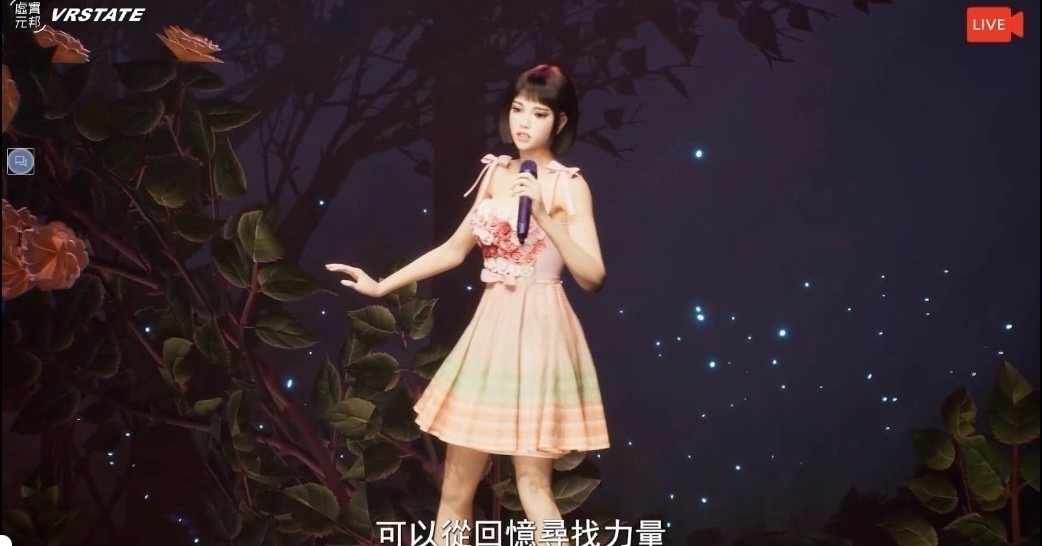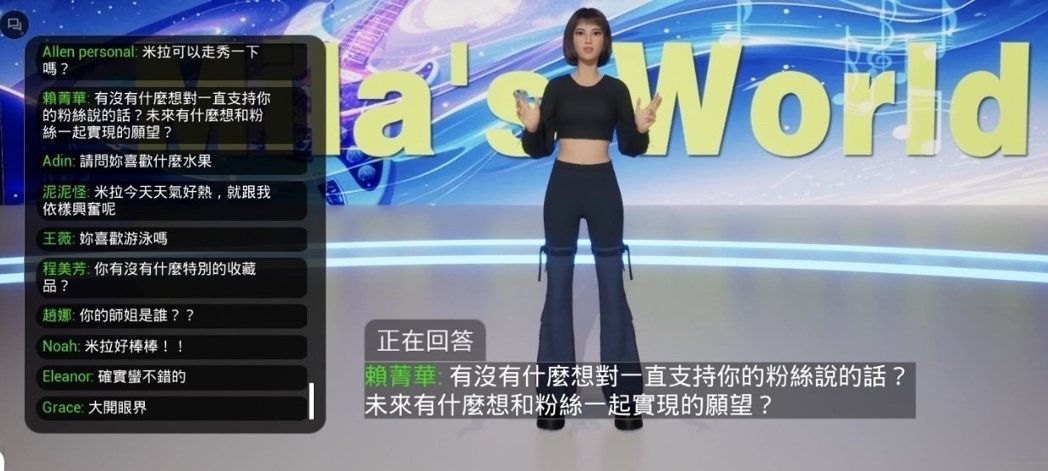Inventec's metaverse technology has reached a new milestone! The virtual idol singer Mila Mii developed by the group recently held eight ticketed online concerts on the VRSTATE Platform over the weekend, demonstrating the group's capabilities in metaverse applications and marking the official commercialization of its metaverse technology. Inventec's Metaverse Technology Division recently granted an exclusive interview to Economic Daily, unveiling the latest trends, challenges, and future plans for the VRSTATE Platform in 2025. Below is the complete interview transcript:
Q1: What new technologies were employed in this performance? (Including previously undisclosed or rarely mentioned technologies)
A: This performance fully utilized the latest metaverse technologies of the VRSTATE platform, integrating AI, 3D modeling, digital twins, and immersive interaction to deliver an enhanced viewing experience. Specifically, the following key technologies were applied:
Next-Generation Intelligent Ticketing System
The platform introduced a digital collectible ticket mechanism, ensuring each ticket's uniqueness and verifiability to eliminate counterfeit tickets.Enhanced Stage Rehearsal System (3D+AI)
This system combines 3D spatial technology, enabling virtual characters to rehearse in virtual stage environments. Through AI algorithms, it dynamically adjusts scenes, lighting, special effects, and motion capture in real-time, significantly reducing traditional rehearsal time and improving collaboration efficiency between directors and virtual performers.Entertainment AI Model (AI-Generated Content, AIGC)
VRSTATE's AI model can generate real-time stage visuals and interactive content, dynamically adapting to the performance atmosphere.3D Costume Creation System
Leveraging AI design, physics simulation, and 3D modeling, the platform creates digital fashion applicable to both virtual characters and physical stages. Audiences can purchase digital collectible outfits for personalization, while the system ensures real-time synchronization of fabric dynamics with performance movements.AI Interaction Generation System
The platform's AI virtual humans engage with live audiences through real-time chat data analysis, taking audience interaction to new heights.
These technological innovations are not only transforming traditional entertainment workflows but also propelling the future development of metaverse entertainment experiences, representing a significant exploration of next-generation entertainment models!
Q2: Does this performance signify the successful commercialization of Inventec's VRSTATE platform?
A: This event marks a crucial step toward commercialization, demonstrating the maturity of VRSTATE's technology and services. We've proven that metaverse technologies can effectively integrate cultural content creation into tangible cultural-tech products with commercial potential.
Currently, VRSTATE provides comprehensive support for metaverse content creation and performances, including AI-generated content (AIGC), 3D virtual avatars, digital collectibles, and AI interactive experiences, offering new development opportunities for the cultural entertainment industry. This empowers content creators to easily produce virtual performances and digital cultural products while driving growth in the digital asset economy.
However, true commercialization success requires broader participation from cultural content providers. VRSTATE aims to attract more artists, musicians, performance groups, and IP holders to co-create the future metaverse ecosystem. Only when this ecosystem matures with complete content, user engagement, and sustainable business models will we achieve full commercialization.
The success of eight concerts across two days has validated the technology's feasibility and market potential. VRSTATE will continue collaborating with industry partners to advance metaverse business models, creating global opportunities for cultural and creative industries as we collectively usher in the metaverse era!
Q3: What are the Metaverse Technology Division's expectations for 2025? (E.g., anticipating increased adoption of VRSTATE technology)
A: 2025 will witness accelerated growth in metaverse technology adoption. VRSTATE's vision extends beyond entertainment expansion to drive cross-industry upgrades through metaverse technologies, enabling broader participation in the new digital economy. Our focus areas include:
Empowering Taiwan's Content Industry
Establish an open metaverse platform for Taiwanese content providers, creators, and brands to rapidly deploy premium content and expand market reach.Expanding Applications to Education, Gaming, Fashion, Healthcare, and Enterprise
Accelerate metaverse integration across diverse sectors, transforming it into a key value driver for industrial efficiency beyond entertainment and virtual performances."Software-Sells-Hardware" Strategy
Implement a phased rollout of metaverse terminal products to establish a complete "virtual-real synergy" market ecosystem.
Q4: What challenges will the 2025 metaverse market face?
A: While the metaverse represents one of AI's most crucial applications - redefining digital entertainment, social interaction, and business models while transforming education, enterprise operations, healthcare, and cultural industries - key challenges remain:
VRSTATE's Perspective on 2025 Challenges:
Integration and Optimization of AI, 3D, and HCI
Combining AI, 3D modeling, immersive interaction (VR/AR), motion capture, and digital twins into seamless, low-latency, high-fidelity experiences remains technically demanding.Privacy and Data Security
As AI-driven personalized services and behavioral analytics expand in metaverse applications, data security and privacy protection require heightened attention.Market Adoption and Business Model Validation
Despite enormous potential, achieving widespread consumer acceptance requires addressing hardware accessibility, content ecosystem development, and user retention challenges.Real-World Application Implementation
Metaverse success depends on expanding beyond gaming/entertainment into education, enterprise, healthcare, and industrial design. Overcoming adoption barriers in these sectors remains critical.
These challenges present opportunities for innovation. VRSTATE will continue advancing technological development through collaborations with industry partners, content creators, and technical experts to build a sustainable metaverse ecosystem.
Q5: What's next after Mila Mii for the Metaverse Technology Division?
A: Our core mission is building a deeply integrated virtual-real world. VRSTATE believes anyone with knowledge, content, stories, or talents can become the next AI Agent-powered virtual human. This transformation will extend beyond entertainment into education, business, healthcare, social interaction, and enterprise operations, ushering in an era of "Intelligent Virtual Humans × Industrial Applications".
AI Agents: The Future of Metaverse Development
Future AI Agents will evolve into "intelligent companions" with learning capabilities and personalized interactions, adapting to various scenarios.AI+Metaverse Driving Industrial Innovation
Core technologies including AI, 3D modeling, and HCI will propel intelligent virtual human applications across sectors.Towards Emotionally Intelligent Virtual Companions
As AI Agent technology advances, we aim to create more intelligent, realistic, and emotionally aware virtual humans that actively participate in education, business, healthcare, creative industries, and personal life.




 Virtual idol singer Mila Mii developed by Inventec's Metaverse Technology Division. Provided by Inventec.
Virtual idol singer Mila Mii developed by Inventec's Metaverse Technology Division. Provided by Inventec.

